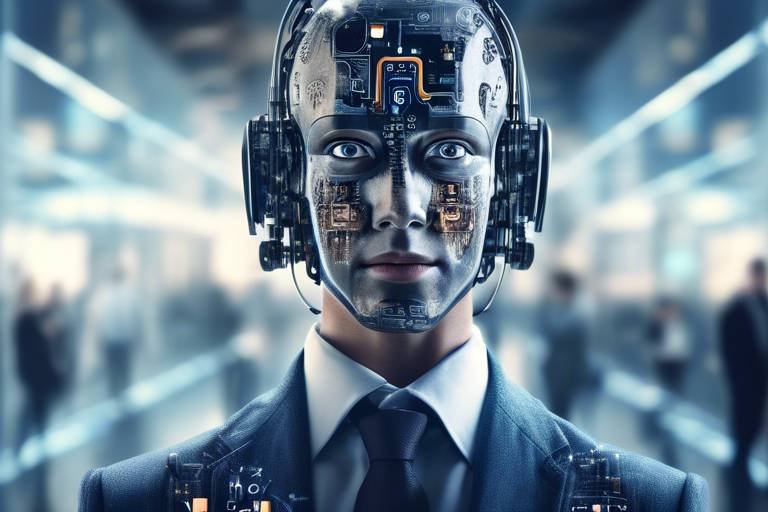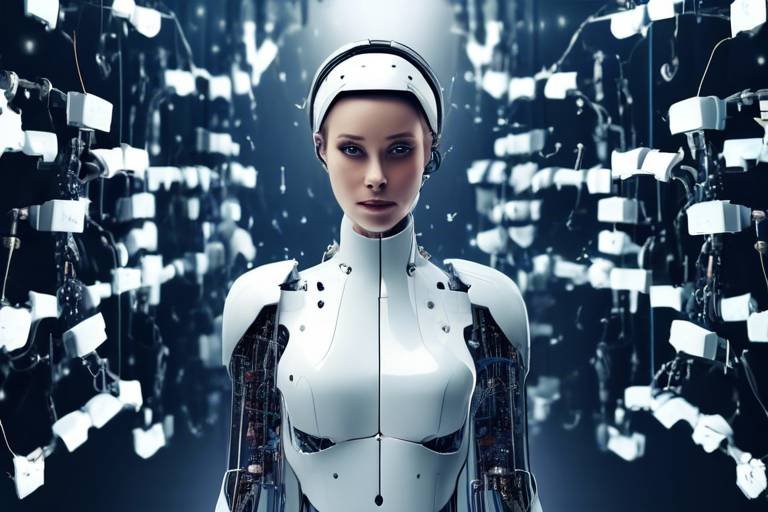Future Skills Needed to Thrive in an AI-Driven Workplace
As we stand on the brink of a technological revolution, the workplace is evolving at a breakneck speed, largely fueled by artificial intelligence (AI). This transformation is not just about the tools we use; it’s about the skills we need to thrive in an environment where AI plays a pivotal role. Imagine walking into an office where machines handle mundane tasks, leaving humans to focus on more complex and creative challenges. Sounds exciting, right? But what does it mean for you? In this article, we’ll delve into the essential skills that will not only help you survive but also thrive in this new landscape. From adaptability to emotional intelligence, these skills are your ticket to success in an AI-driven world.
In today's fast-paced world, the only constant is change. As AI continues to reshape industries, the ability to adapt and be flexible is more critical than ever. Think about it: if you can pivot quickly in response to new technologies or shifting job demands, you’ll not only enhance your job security but also open up new avenues for career growth. Adaptability is like a superpower in the workplace; it allows you to embrace change rather than resist it. Whether it’s learning a new software tool or adjusting to a new team structure, being adaptable can set you apart from your peers.
As AI takes over routine tasks, human roles are evolving towards more complex problem-solving scenarios. This means that critical thinking is no longer just a nice-to-have; it’s a must-have skill. When faced with intricate challenges, the ability to analyze situations, weigh options, and make informed decisions is invaluable. Imagine being the go-to person in your team for tackling tough problems—how rewarding would that be? Critical thinking enables you to not only identify issues but also devise innovative solutions that AI alone cannot generate.
With AI systems generating vast amounts of data, having strong analytical skills is essential for interpreting this information effectively. It’s not just about crunching numbers; it’s about making sense of the data and using it to drive decisions. For instance, if a marketing team utilizes AI to analyze customer behavior, your ability to interpret those insights can lead to more effective campaigns. In this way, analytical skills empower you to leverage AI-generated data for strategic advantage.
Understanding data is crucial in an AI-driven workplace. Data literacy refers to the ability to read, work with, analyze, and communicate with data. In a world where data is the new oil, being data literate means you can effectively use AI tools and interpret results for strategic decision-making. Imagine being able to confidently present data findings to your team or stakeholders—how much more credible would you be?
A basic understanding of statistics is another powerful tool in your skillset. Familiarity with statistical concepts helps you grasp how AI algorithms work and the outcomes they produce. This knowledge not only enhances your collaboration with data scientists but also enables you to critically evaluate the results generated by AI systems. Just like a chef needs to know how to balance flavors, you need to understand statistics to balance data insights effectively.
While AI can analyze data and automate tasks, it cannot replicate the uniquely human trait of creativity. Fostering creativity in the workplace can lead to innovative solutions that set your organization apart from the competition. Think of creativity as the secret sauce that spices up your work environment. When you encourage creative thinking, you not only enhance collaboration among team members but also drive the organization toward groundbreaking ideas. After all, in a world where machines do the heavy lifting, human creativity becomes the most valuable asset.
In an AI-driven environment, where machines may handle tasks, the human touch remains irreplaceable. Emotional intelligence is essential for effective communication and teamwork. It encompasses the ability to understand your own emotions and those of others, which is crucial for building strong relationships in the workplace. In a world where AI can analyze data but not feelings, your emotional intelligence will be your greatest ally in fostering a positive workplace culture.
As AI tools integrate into our workflows, collaboration becomes paramount. Effective collaboration skills allow you to work seamlessly with diverse teams and technologies. Whether you’re brainstorming ideas or executing a project, being able to communicate and collaborate effectively will ensure that everyone is on the same page. Imagine a symphony where each instrument plays in harmony—this is what collaboration in the workplace should feel like.
As AI changes workflows, conflicts may arise, and this is where strong conflict resolution skills come into play. The ability to navigate disagreements and maintain harmony within your team is essential for productivity. Think of conflict resolution as a bridge that connects different perspectives, allowing teams to move forward together. In a world driven by AI, your interpersonal skills will help you keep the peace and ensure that teams remain focused on their goals.
- What are the most important skills for an AI-driven workplace? Adaptability, critical thinking, creativity, emotional intelligence, and collaboration skills are essential.
- How can I improve my adaptability? Stay open to learning new technologies and be willing to embrace change.
- Why is emotional intelligence important in the workplace? It enhances communication and teamwork, fostering a positive work culture.
- Can AI replace human jobs? While AI can automate tasks, it cannot replicate uniquely human skills like creativity and emotional intelligence.

Adaptability and Flexibility
In today's fast-paced world, the only constant is change. As we find ourselves in an increasingly AI-driven workplace, the ability to adapt and remain flexible is not just a bonus—it's a necessity. Imagine navigating a river that’s constantly shifting its course; if you can’t adjust your paddling technique, you’ll likely end up in murky waters. Similarly, being adaptable means being prepared to embrace new technologies, processes, and ways of working that AI introduces. This adaptability is crucial for enhancing your job security and fostering career growth in this dynamic landscape.
Adaptability isn't solely about being open to change; it’s about actively seeking opportunities for growth. For instance, consider a scenario where your company adopts a new AI tool designed to streamline project management. Instead of resisting this change out of fear, an adaptable employee would take the initiative to learn how to use this tool effectively, thereby positioning themselves as a valuable asset to the team. This proactive approach not only boosts personal confidence but also demonstrates a commitment to the organization’s success.
Moreover, organizations are increasingly recognizing the importance of adaptability in their workforce. According to a recent survey conducted by the World Economic Forum, companies that prioritize adaptability and flexibility in their employees are more likely to thrive in the long run. Here’s a quick look at some of the benefits that come from fostering an adaptable workforce:
| Benefit | Description |
|---|---|
| Increased Resilience | Employees who are adaptable can bounce back from setbacks more quickly, maintaining productivity and morale. |
| Enhanced Innovation | Adaptable teams are more likely to experiment with new ideas and approaches, driving innovation. |
| Improved Collaboration | Flexibility in work styles fosters better teamwork, as employees can adjust to each other's needs. |
In conclusion, adaptability and flexibility are not just buzzwords; they are essential skills for anyone looking to succeed in an AI-influenced workplace. By embracing change and continuously learning, you can not only secure your position but also pave the way for future opportunities. So, the next time you encounter a new technology or process at work, ask yourself: How can I adapt and thrive in this situation?

Critical Thinking and Problem Solving
In an age where artificial intelligence (AI) is taking over routine tasks, the landscape of work is evolving dramatically. As machines handle the mundane, the human role is shifting toward more complex challenges that require critical thinking and problem-solving skills. But what does this really mean for you? It’s not just about being able to think; it’s about thinking critically, questioning assumptions, and approaching problems with a fresh perspective. In this new AI-driven workspace, the ability to dissect problems and devise innovative solutions will set you apart from the crowd.
Imagine you’re a chef in a kitchen where a robot can chop vegetables and cook meals. While the robot excels at these tasks, it can’t create a new recipe or adjust flavors based on the diners' reactions. Similarly, in the workplace, while AI can analyze data and present findings, it lacks the human touch to interpret those findings in a meaningful way. This is where your critical thinking skills come into play. You’ll need to ask the right questions, challenge the status quo, and think outside the box to address the intricate challenges that arise.
Moreover, as AI systems become more integrated into our daily tasks, the importance of analytical skills cannot be overstated. These skills are essential for interpreting the vast amounts of data generated by AI systems. When you can analyze this data effectively, you can make informed decisions that drive your projects and your organization forward. For instance, consider the following key analytical skills that are becoming increasingly vital in the AI landscape:
- Data Interpretation: Understanding what the data means and how it applies to your specific context.
- Trend Analysis: Identifying patterns in data to predict future outcomes.
- Decision Making: Using data insights to guide strategic choices.
To truly thrive, you must also embrace data literacy. This means not only understanding data but also being able to leverage AI tools to extract valuable insights. Data literacy empowers you to interpret results accurately, which is crucial for strategic decision-making. In today’s world, simply having access to data isn't enough; knowing how to read and use it effectively can make all the difference.
Additionally, a basic understanding of statistical knowledge can significantly enhance your capabilities. Familiarity with statistics allows you to comprehend AI algorithms and their outcomes better. It also fosters collaboration with data scientists, ensuring that you can communicate effectively and contribute meaningfully to projects. Think of statistical knowledge as the language of data—it enables you to engage in conversations that can lead to improved project outcomes.
In summary, as we navigate this AI-driven future, honing your critical thinking and problem-solving skills is essential. These skills will not only enhance your employability but also empower you to tackle the challenges of tomorrow head-on. Remember, while AI can process information at lightning speed, it’s your unique human perspective that will drive innovation and creativity in the workplace.
- What is critical thinking? Critical thinking is the ability to analyze facts to form a judgment. It involves questioning assumptions and evaluating evidence.
- Why is problem-solving important in the workplace? Problem-solving skills are crucial for addressing complex challenges and making informed decisions that drive success.
- How can I improve my analytical skills? You can improve analytical skills by practicing data interpretation, engaging in critical discussions, and working on real-world problems.
- What role does emotional intelligence play in problem-solving? Emotional intelligence enhances collaboration and communication, making it easier to navigate challenges and work effectively with others.

Analytical Skills
In today’s world, where artificial intelligence is not just a buzzword but a reality, have become more crucial than ever. These skills enable employees to sift through the vast amounts of data generated by AI systems and extract meaningful insights. Imagine being handed a treasure map, but instead of gold, it leads to valuable data points that can drive your company’s strategy. Without the ability to analyze and interpret this data, you might as well be wandering aimlessly in search of a pot of gold that doesn’t exist.
So, what exactly do we mean by analytical skills? At their core, these skills involve the ability to break down complex information into understandable parts. This can include identifying patterns, drawing conclusions, and making predictions based on data. For instance, if an AI system flags a sudden drop in customer engagement, an employee with strong analytical skills can dive deep into the data to uncover the root cause—be it a glitch in the system, a change in customer preferences, or perhaps a marketing campaign that didn’t resonate.
To illustrate the importance of analytical skills, consider the following table that highlights key aspects of these skills in the workplace:
| Aspect | Description | Impact on Workplace |
|---|---|---|
| Data Interpretation | Ability to understand and make sense of data. | Informed decision-making that can lead to better business outcomes. |
| Pattern Recognition | Identifying trends and anomalies in data. | Proactive strategies to address potential issues before they escalate. |
| Predictive Analysis | Using data to forecast future trends. | Enhanced strategic planning and resource allocation. |
| Problem-Solving | Finding solutions based on data insights. | Increased efficiency and innovation in processes. |
Furthermore, analytical skills are not just about crunching numbers; they also involve collaboration with various departments. For example, when sales teams and data analysts work together, they can create targeted campaigns that resonate with customers. This collaboration is vital in an AI-driven workplace, where different teams may have varying levels of understanding regarding data interpretation. By fostering a culture of analytical thinking, organizations can bridge these gaps and ensure that everyone is on the same page.
In conclusion, honing analytical skills is not merely an option; it’s a necessity in an AI-driven landscape. As we continue to embrace these technologies, the ability to analyze and interpret data will set individuals apart in their careers. The question is, are you ready to sharpen your analytical skills and unlock the treasure trove of insights that AI has to offer?

Data Literacy
In today's AI-driven workplace, has emerged as a fundamental skill that empowers employees to navigate the complex landscape of information and analytics. But what exactly does it mean to be data literate? Essentially, it involves the ability to read, understand, create, and communicate data effectively. This ability is not just for data scientists or analysts; it's a skill that every employee should strive to acquire. As artificial intelligence systems generate vast amounts of data, the capacity to interpret this information becomes crucial for making informed decisions that can drive business success.
Imagine walking into a meeting where your team is discussing the latest sales figures. Instead of feeling lost in a sea of graphs and numbers, your data literacy allows you to grasp the trends and insights being presented. You can contribute meaningfully to the conversation, asking relevant questions and offering suggestions based on your understanding of the data. This not only enhances your own career prospects but also positions you as a valuable asset to your organization.
Moreover, being data literate means being able to leverage AI tools effectively. These tools can analyze data at lightning speed, but without the ability to interpret the results, employees may miss out on valuable insights. For example, consider the following key areas where data literacy plays a vital role:
- Decision-Making: Employees who understand data can make better decisions that align with organizational goals.
- Strategic Planning: Data literacy helps teams to forecast trends, identify opportunities, and plan for the future effectively.
- Performance Measurement: Understanding metrics and KPIs allows employees to evaluate their performance and that of their teams accurately.
To illustrate the importance of data literacy in the workplace, let's take a look at a hypothetical scenario:
| Scenario | Data Literate Employee's Response | Non-Data Literate Employee's Response |
|---|---|---|
| Sales data shows a decline in Q2 | Analyzes data to identify specific factors contributing to the decline and suggests targeted marketing strategies. | Expresses concern but lacks actionable insights or suggestions for improvement. |
| Customer feedback indicates dissatisfaction | Uses data to pinpoint common issues and proposes solutions based on customer preferences. | Feels overwhelmed by the feedback and unsure how to address the concerns. |
As you can see, data literacy can significantly impact how employees respond to challenges and opportunities within their organizations. It's not just about crunching numbers; it's about transforming data into actionable insights that can lead to innovative solutions and better outcomes. In an era where data is often referred to as the new oil, being data literate is akin to possessing a map to navigate this vast resource.
In conclusion, fostering a culture of data literacy within your organization can enhance collaboration, drive innovation, and ultimately lead to greater success in an AI-driven workplace. As we continue to evolve alongside technology, embracing data literacy will undoubtedly become a crucial element in shaping the future of work.
Q: What is data literacy?
A: Data literacy is the ability to read, understand, create, and communicate data effectively. It enables employees to make informed decisions based on data insights.
Q: Why is data literacy important in an AI-driven workplace?
A: As AI generates vast amounts of data, being data literate allows employees to interpret and leverage this information to enhance decision-making, strategic planning, and performance measurement.
Q: How can I improve my data literacy?
A: You can improve your data literacy by taking courses, attending workshops, and practicing with data visualization tools. Engaging with data regularly will also help you become more comfortable with it.

Statistical Knowledge
In today's data-driven world, having a solid grasp of is more important than ever, especially in an AI-driven workplace. Imagine trying to navigate a vast ocean without a compass; that’s what it’s like working with data without understanding the basics of statistics. Statistical knowledge equips employees with the tools to interpret AI-generated data accurately, enabling them to draw meaningful conclusions and make informed decisions. This skill set is not just for data scientists; it’s essential for everyone who interacts with data in their daily tasks.
To put it simply, statistics is the backbone of data analysis. It allows us to understand patterns, trends, and anomalies within datasets. For instance, when a marketing team receives data on customer behavior from an AI tool, understanding statistical concepts like mean, median, and standard deviation can help them discern what the data is truly saying. Without this knowledge, teams may misinterpret data, leading to poor decision-making and missed opportunities. So, how can employees enhance their statistical knowledge?
- Online Courses: Many platforms offer courses tailored to different skill levels, making it easier for anyone to learn at their own pace.
- Workshops and Seminars: Participating in industry-related workshops can provide hands-on experience and practical applications of statistical methods.
- Collaboration with Data Experts: Engaging with data scientists can offer insights and real-world applications of statistics in business contexts.
Moreover, understanding basic statistical concepts fosters better communication between teams. When marketing, sales, and data teams collaborate, a common language based on statistical understanding can bridge gaps and enhance project outcomes. For example, if a sales team understands how to interpret sales forecasts generated by AI using statistical methods, they can adjust their strategies accordingly, leading to more effective campaigns and improved sales performance.
To illustrate the importance of statistical knowledge, consider the following table that highlights common statistical concepts and their applications in an AI-driven workplace:
| Statistical Concept | Application |
|---|---|
| Mean | Determining average sales over a period to forecast future performance. |
| Standard Deviation | Measuring variability in customer data to identify target markets. |
| Regression Analysis | Predicting outcomes based on historical data trends. |
| Hypothesis Testing | Validating assumptions about customer behavior before launching new products. |
In conclusion, statistical knowledge is not just a nice-to-have; it’s a must-have skill in an AI-enhanced workplace. By investing time in learning and applying these concepts, employees can significantly improve their ability to collaborate with data scientists, make data-driven decisions, and ultimately drive better business outcomes. So, are you ready to dive into the world of statistics and unlock the potential of data in your career?
Q: Do I need a degree in statistics to work with data?
A: No, while a degree can be beneficial, many resources are available online that can help you learn statistical concepts without formal education.
Q: How can I apply statistical knowledge in my job?
A: You can apply statistical knowledge to analyze trends, make forecasts, and interpret AI-generated reports, helping you make informed decisions.
Q: What resources are best for learning statistics?
A: Websites like Coursera, edX, and Khan Academy offer excellent courses on statistics tailored to various skill levels.

Creativity and Innovation
In a world increasingly dominated by artificial intelligence, creativity and innovation stand as the last bastions of uniquely human capabilities. While machines excel at processing data and performing repetitive tasks, they lack the innate ability to think outside the box—the very essence of creativity. This is where human workers can shine, leveraging their imaginative skills to foster innovation in the workplace.
Think of creativity as a spark that ignites new ideas, while innovation is the fire that transforms those ideas into tangible solutions. In an AI-enhanced environment, the ability to innovate becomes crucial for several reasons:
- Problem Solving: Creative thinking allows employees to approach challenges from different angles, leading to unique solutions that automated systems may overlook.
- Competitive Advantage: Organizations that encourage creativity are more likely to stay ahead of their competitors by developing groundbreaking products and services.
- Team Collaboration: Creative teams foster an environment where diverse ideas can flourish, enhancing collaboration and driving collective success.
Moreover, encouraging a culture of creativity can lead to a happier workplace. When employees feel free to express their ideas and contribute to innovative projects, they are more engaged and satisfied with their jobs. This sense of ownership not only boosts morale but also enhances productivity. Companies that prioritize creativity often see lower turnover rates, as employees are more likely to stay in an environment that values their contributions.
To cultivate creativity in an AI-driven workplace, organizations can implement several strategies:
| Strategy | Description |
|---|---|
| Brainstorming Sessions | Regularly scheduled meetings where team members can share ideas without judgment, fostering an open dialogue. |
| Cross-Disciplinary Teams | Encouraging collaboration among employees from different departments to bring diverse perspectives to problem-solving. |
| Creative Workshops | Hosting workshops that focus on creative thinking techniques and exercises to stimulate innovative thought. |
In conclusion, while AI will continue to reshape the workplace, it is the human capacity for creativity and innovation that will drive success in this new landscape. By embracing these skills and fostering an environment that encourages them, employees can not only thrive but also lead the way in creating a brighter, more innovative future.
- What is the role of creativity in an AI-driven workplace?
Creativity plays a crucial role in generating unique solutions to problems that AI may not be able to address. It allows humans to think outside the box and innovate. - How can organizations foster creativity among employees?
Organizations can foster creativity by encouraging open communication, hosting brainstorming sessions, and forming cross-disciplinary teams. - Why is emotional intelligence important in a creative environment?
Emotional intelligence enhances collaboration and communication, allowing teams to work more effectively together, especially when navigating creative processes.

Emotional Intelligence
Emotional intelligence (EI) is rapidly becoming a cornerstone of success in the modern workplace, especially in environments increasingly influenced by artificial intelligence (AI). Unlike technical skills, which can often be automated or replicated by machines, emotional intelligence taps into the uniquely human ability to understand and manage emotions—both our own and those of others. This capability is essential for fostering effective communication, building strong relationships, and enhancing teamwork. In a world where AI takes over routine tasks, the need for strong interpersonal skills becomes not just beneficial but crucial.
Imagine walking into a meeting where the atmosphere is tense because of a looming deadline. A colleague is visibly stressed, and another is frustrated due to miscommunication. Here, emotional intelligence shines; it's the ability to read the room, to sense unspoken feelings, and to respond appropriately. Individuals with high EI can navigate these situations with empathy, offering support and understanding, which not only calms the environment but also promotes collaboration and productivity.
Moreover, emotional intelligence enhances workplace culture by promoting a sense of belonging and trust among team members. When employees feel understood and valued, they are more likely to engage fully with their work and contribute positively to team dynamics. This is especially important in an AI-driven workplace where teams may comprise diverse individuals with varying backgrounds and perspectives. To illustrate this, consider the following key components of emotional intelligence:
- Self-awareness: Recognizing one’s emotions and their impact on performance.
- Self-regulation: Managing emotions effectively, particularly in stressful situations.
- Motivation: Harnessing emotions to pursue goals with energy and persistence.
- Empathy: Understanding others' emotions, which strengthens interpersonal relationships.
- Social skills: Building rapport and managing relationships effectively.
As organizations increasingly rely on AI tools, understanding the emotional landscape of the workplace becomes even more important. Employees with high emotional intelligence can bridge the gap between technology and human interaction, ensuring that the human element remains strong. They can facilitate communication between diverse teams and help resolve conflicts that may arise from misunderstandings or differing perspectives.
Furthermore, emotional intelligence plays a significant role in leadership. Leaders who possess high EI can inspire their teams, create a positive work environment, and navigate challenges with grace. They are adept at recognizing the emotional needs of their team members and responding with empathy, which fosters loyalty and motivation. In fact, research has shown that teams led by emotionally intelligent leaders tend to be more engaged and productive, showcasing the tangible benefits of EI in the workplace.
In conclusion, as we move further into an AI-driven future, emotional intelligence will not just be an added advantage; it will be a vital skill necessary for thriving in the workplace. By cultivating emotional intelligence, employees can enhance their communication, collaboration, and conflict resolution skills, making them invaluable assets to their organizations. So, whether you’re a seasoned professional or just starting your career, investing in emotional intelligence is an investment in your future success.
- What is emotional intelligence? Emotional intelligence refers to the ability to recognize, understand, and manage our own emotions while also being aware of and influencing the emotions of others.
- Why is emotional intelligence important in the workplace? It is crucial for effective communication, teamwork, and leadership, especially in environments influenced by AI where interpersonal interactions remain key.
- How can I improve my emotional intelligence? You can improve EI by practicing self-awareness, seeking feedback, and focusing on empathy in your interactions with others.

Collaboration Skills
In today's rapidly evolving workplace, especially one influenced by artificial intelligence, have become more crucial than ever. Think about it: when machines take over mundane tasks, the true value of human contribution lies in our ability to work together effectively. It's like being in a band where each musician plays a different instrument; the magic happens when they harmonize. In an AI-integrated environment, collaboration isn't just beneficial—it's essential for thriving in the face of change.
Effective collaboration involves a blend of communication, teamwork, and interpersonal skills. When teams can communicate openly, they foster an environment of trust and respect. This is particularly important when diverse teams come together, often with varying backgrounds and expertise. In such settings, clear communication can bridge gaps and help everyone feel valued. It's not just about sharing ideas; it's about understanding each other's perspectives and leveraging those differences to drive innovation.
Moreover, collaboration skills are not just about working well with others; they also encompass the ability to navigate and integrate AI technologies into team processes. For instance, when a team works on a project that involves AI tools, understanding how to collaborate with these technologies can enhance productivity. Employees must be able to discuss insights generated by AI and incorporate them into their strategies effectively. This requires a willingness to learn and adapt, as well as the ability to explain complex concepts in simple terms.
As we embrace AI in our workplaces, conflict resolution becomes a key component of collaboration. It's inevitable that differing opinions will arise, especially when new technologies are introduced. A skilled collaborator knows how to address conflicts constructively, ensuring that discussions remain productive rather than devolving into arguments. By focusing on solutions rather than problems, teams can maintain momentum and keep projects on track, even in the face of challenges.
To illustrate the importance of collaboration skills, consider the following table that highlights key attributes of effective collaborators:
| Attribute | Description |
|---|---|
| Active Listening | Paying full attention to others, ensuring their ideas are heard and considered. |
| Open-mindedness | Being receptive to new ideas and different perspectives, fostering a culture of innovation. |
| Empathy | Understanding and sharing the feelings of others, which enhances team cohesion. |
| Adaptability | Willingness to adjust one's approach based on team dynamics and project needs. |
In conclusion, as we navigate an AI-driven workplace, honing our collaboration skills will be vital. It's not just about working together; it's about creating an environment where everyone can contribute their best, leveraging technology to enhance human interaction. So, the next time you find yourself in a team setting, remember: your ability to collaborate effectively could very well be the key to your success.
- What are collaboration skills? Collaboration skills refer to the abilities that enable individuals to work well with others, including communication, teamwork, and conflict resolution.
- Why are collaboration skills important in an AI-driven workplace? As AI takes over routine tasks, human roles shift to more complex interactions, making effective collaboration essential for innovation and productivity.
- How can I improve my collaboration skills? You can enhance your collaboration skills by actively listening, being open to feedback, practicing empathy, and engaging in team-building activities.

Conflict Resolution
In any workplace, especially one driven by the rapid advancements of artificial intelligence, conflicts are inevitable. As teams become more diverse—comprising individuals from various backgrounds, skill sets, and perspectives—the potential for misunderstandings and disagreements increases. So, how do we navigate these turbulent waters? The answer lies in honing our conflict resolution skills. These skills are not just about quelling disputes; they are about fostering a culture of open communication and collaboration.
Imagine a scenario where a project team is divided over the direction of a new initiative. Half the team believes in leveraging AI to automate processes, while the other half is concerned about the implications for job security and creativity. Without effective conflict resolution, this disagreement could spiral into a toxic atmosphere, stifling innovation and productivity. However, with the right approach, these differing viewpoints can be transformed into a creative dialogue that enhances the project. Here’s how:
- Active Listening: It’s essential to listen to all parties involved. This means hearing not just the words, but understanding the emotions and motivations behind them. When people feel heard, they are more likely to engage in constructive discussions.
- Empathy: Put yourself in the shoes of your colleagues. Understanding their perspectives and feelings can bridge gaps and foster a sense of unity.
- Open Communication: Encourage an environment where team members feel safe expressing their opinions. Transparency can mitigate misunderstandings and help clarify intentions.
- Focus on Solutions: Rather than dwelling on the problem, steer the conversation towards finding a resolution. This proactive approach can often lead to innovative solutions that satisfy everyone involved.
Moreover, it’s crucial to recognize that conflict resolution is not a one-size-fits-all process. Different situations may require different strategies. For instance, a minor disagreement might be resolved through a casual conversation, while a more significant conflict could necessitate a formal mediation process. Understanding the context and the individuals involved is key to selecting the most effective resolution method.
To further illustrate the importance of conflict resolution in an AI-driven workplace, consider the following table that outlines common conflict scenarios and potential resolution strategies:
| Conflict Scenario | Resolution Strategy |
|---|---|
| Disagreement on project direction | Facilitate a brainstorming session to explore all ideas |
| Miscommunication between team members | Encourage a feedback loop to clarify misunderstandings |
| Resistance to AI implementation | Provide training and address concerns through open forums |
In conclusion, mastering conflict resolution is not just about resolving disputes; it’s about creating an environment where collaboration thrives. In an AI-enhanced workplace, where technology often dictates workflows, maintaining strong human connections through effective conflict resolution can lead to greater innovation, improved morale, and ultimately, a more successful organization.
Q: Why is conflict resolution important in an AI-driven workplace?
A: Conflict resolution is crucial because it helps maintain a positive work environment, encourages collaboration, and fosters creativity, all of which are essential for navigating the complexities of an AI-driven landscape.
Q: What are some common conflict resolution techniques?
A: Common techniques include active listening, empathy, open communication, and focusing on solutions rather than problems.
Q: How can I improve my conflict resolution skills?
A: You can improve your skills by practicing active listening, engaging in role-playing scenarios, and seeking feedback from colleagues on your communication style.
Q: Is conflict always negative?
A: Not necessarily. Conflict can lead to positive outcomes when managed effectively, such as innovative solutions and stronger team dynamics.
Frequently Asked Questions
- What skills are essential for thriving in an AI-driven workplace?
In an AI-driven workplace, adaptability, critical thinking, creativity, and emotional intelligence are crucial. These skills allow employees to navigate the changing landscape effectively, solve complex problems, and collaborate successfully with both machines and humans.
- Why is adaptability so important in today's job market?
Adaptability is vital because the work environment is constantly evolving due to technological advancements. Being flexible helps you stay relevant, enhances job security, and opens up new opportunities for career growth as roles shift and new technologies emerge.
- How does critical thinking contribute to workplace success?
Critical thinking enables employees to analyze situations, make informed decisions, and solve intricate problems that AI cannot address. As AI takes over routine tasks, human roles will focus more on strategic thinking and complex problem-solving, making this skill indispensable.
- What role does emotional intelligence play in an AI-enhanced workplace?
Emotional intelligence fosters effective communication and teamwork. It allows individuals to empathize with others, navigate interpersonal relationships, and resolve conflicts, which is essential for maintaining a positive and productive work environment in an AI-integrated setting.
- Can creativity coexist with AI in the workplace?
Absolutely! Creativity is a uniquely human trait that AI cannot replicate. In fact, fostering creativity can lead to innovative solutions and enhance collaboration, allowing teams to leverage AI tools more effectively and think outside the box.
- What are analytical skills, and why are they important?
Analytical skills involve the ability to interpret and analyze data, which is increasingly important in an AI-driven workplace. These skills enable employees to make data-informed decisions, understand trends, and collaborate effectively with data scientists.
- How can I improve my data literacy?
Improving data literacy can be achieved through training and practice. Start by familiarizing yourself with basic data concepts, engage in courses that focus on data analysis, and use AI tools to gain hands-on experience in interpreting data.
- What is the significance of conflict resolution skills?
Conflict resolution skills are essential for managing disputes that may arise due to changes in workflows or team dynamics in an AI-driven environment. These skills help maintain harmony and productivity, ensuring that teams can work effectively even when challenges occur.



















